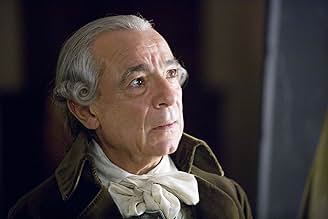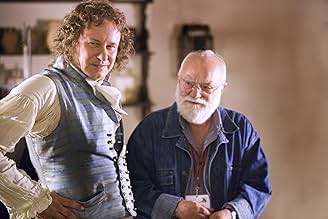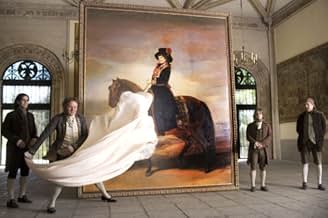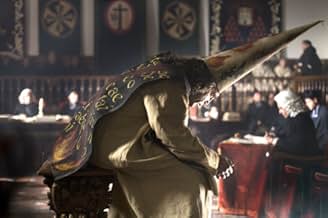NOTE IMDb
6,9/10
33 k
MA NOTE
Le peintre Francisco Goya se retrouve face à un scandale impliquant sa muse, qui est accusée d'hérésie par un moine.Le peintre Francisco Goya se retrouve face à un scandale impliquant sa muse, qui est accusée d'hérésie par un moine.Le peintre Francisco Goya se retrouve face à un scandale impliquant sa muse, qui est accusée d'hérésie par un moine.
- Réalisation
- Scénario
- Casting principal
- Récompenses
- 2 victoires et 5 nominations au total
Avis à la une
I think Goya is after all just a pretext. What Forman wanted to talk about is how people are overwhelmed by history. It's a difficult idea to be grasped for people who live in wealthy societies where nothing much happens and the biggest problems are having more money than you already have and what to do on Saturday night. But Forman manages to show you how you can be powerless and doomed when history moves fast--too fast. The real protagonist of the story is not the painter, but the former Dominican priest, whose life is totally changed--and ultimately destroyed--by the big historical events (the French Revolution, the French invasion of Spain, the English invasion of Spain, the Restoration). The same may be said for the other characters in the story. Goya is there as a witness, and as the symbolic figure of the artist who manages to create something even out of utter destruction. One could say that Goya's Ghosts are exactly those people and events Goya witnessed and can't get rid of, so that he has to turn them into drawings and paintings; but the term "ghost" also refers to what individuals are like in those moments when everything is changing and moving towards God knows what goal. The priest and the young girl and all the other people in the story are just pawns of history, who strut and fret on the stage and then disappear. Ghosts, because they can be annihilated in any moment. It's a sad truth, but it's truth, notwithstanding Hollywood's mythologies of super-heroes that can win against all odds. Joyce said that history is a nightmare one tries to wake up from; Forman showed us the nightmare, and the last nightmarish scene of this movie is one of those you can't forget.
There is one great flaw here that almost everyone mentions... and it's true. The accents of the non-Spanish actors clash terribly with the Spanish ones, as well as with each other. That's a real flaw, but if you can get past that, there's a great film waiting to be seen. I found I forgot all about it after the first 10 minutes. The critics just don't get this film. A lot of regular people seem to miss it too. They want a film with a typical "leading" role. They want their morality tales (which this certainly IS) delivered in easy shades of Black and White... no gray. They don't understand films where the title character is primarily an Observer. Sometimes that CAN be dissatisfying, but here the Observer is a genuine genius. Some people want him to be a moral giant, but he's not, he's simply an observer who has actualized the doctor's oath: First, do no harm. This is a brilliant story, and a morally complex one, too. There are some parallels to America in Iraq, though that is not the primary goal. This story illuminates the folly of any regime, liberal or conservative, as each picks its friends and foes, taking 180 degree turns from whoever was last in power. Javier Bardem gives an incredibly canny performance! Natalie Portman is totally unsentimental and totally committed to her multiple roles: just great! Stellan Skarsgard threw me off at first with the sound of his voice, but builds a performance of power and truth, in spite of it. Randy Quaid was a small revelation. And of course the film looks and sounds spectacular, with it's numerous and detailed textures, compositions and sounds. If you want to think; if you like having pat assumptions challenged; if you love people and history and art: see it!
A film by Milos Forman is always an event. This will probably not remain as one of the best in his career, and was surrounded by a level of controversy, not the least among critics who received it very differently. Yet, it is certainly a film to watch.
The story actually does not have Goya (Stellan Skarsgård) in the center. It is rather the story of a corrupt morality policeman of the 18th century (Javier Bardem) imprisoning a young girl (Natalie Portman) on the unjust suspicion of practicing Judaism in secret. It is the story of a police state built on social injustice relying on pretended moral puritanism in order to save the system. This happens at the price of huge human suffering like the drama in the center of the story, and here is the painter as a witness, living the dilemma of becoming involved as a human or remaining a witness as an artist. We know what path Goya chose.
I was not unhappy neither with the acting, nor with the story line, although it is a little bit too melo-dramatic and too much prone to coincidences. Forman is not so much focused on the drama or better say melo-drama, or even in the historical detail, although he seems to be on familiar ground getting back to the period in 'Amadeus'. What he is busy with seems to be more re-creating some of Goya's paintings and prints and tracing back the origin of inspiration of these masterpieces. In a way the film can be read as justification of the choice Goya made in life.
The story actually does not have Goya (Stellan Skarsgård) in the center. It is rather the story of a corrupt morality policeman of the 18th century (Javier Bardem) imprisoning a young girl (Natalie Portman) on the unjust suspicion of practicing Judaism in secret. It is the story of a police state built on social injustice relying on pretended moral puritanism in order to save the system. This happens at the price of huge human suffering like the drama in the center of the story, and here is the painter as a witness, living the dilemma of becoming involved as a human or remaining a witness as an artist. We know what path Goya chose.
I was not unhappy neither with the acting, nor with the story line, although it is a little bit too melo-dramatic and too much prone to coincidences. Forman is not so much focused on the drama or better say melo-drama, or even in the historical detail, although he seems to be on familiar ground getting back to the period in 'Amadeus'. What he is busy with seems to be more re-creating some of Goya's paintings and prints and tracing back the origin of inspiration of these masterpieces. In a way the film can be read as justification of the choice Goya made in life.
Imagine the paintings and drawings of Goya in all their darkness and beauty coming to life - this is Milos Forman's masterful film. Goya (and us)witness the folly of the Spanish royal court, the murderous sadistic perversion of the Catholic Church, the cruel inhumane madness of the Napoleonic War, along with the sensuality and beauty of life passing. This is the film's main focus: to let us experience the time and place as if seen through Francisco de Goya's eyes. As expected of a Milos Forman's film, the locales, the customs, and the overall production replicates the Spain of the late 18th century and early 19th century with the exactitude of a court painting. The cast is also excellent. As an Inquisitor turned a Napoleon's officer, Javier Bardem deserves another Oscar nomination. Stellan Skargsdar as usual does a chameleon-like transformation this time into Goya. Natalie Portman elevates herself into a higher realm of acting as the doomed, beautiful Ines. And Randy Quaid steals the screen for a few seconds as the King. Milos Forman again has given us an emotionally- and intellectually-challenging portrait of a dark era and the role of art and artist. Although some of the dramatization is slightly contrived, the film is compelling and moving and its vision lingers as Goya's art.
The story of the Spanish Inquisition,Napoleanic Wars, a monk and a merchant's daughter and how they affected Francisco Goya.
The movie's plot is complicated,perhaps too complicated, filled with turns and changes its trajectory just when you think it's going one way. You could say that though the story is told from Goya's(Sarsgard) perspective and is primarily advanced by what happens to Ines(Portman) the main character is Lorenzo(Bardem). Its how Lorenzo deals with these situations and how he affects the others that is key. The movie was released a year before No Country For Old Men but Bardem still brings much of the evil and menace he did to Anton Chigurh to this role. However, his role in this film,Lorenzo, is very different and not a deranged killer but more of a scoundrel who carefully picks his tune according to who's in power. Natalie Portman gives a strong performance or performances I should say as she plays two characters. I found this to be distracting as nobody is so identical to their parents but the film is a fictional story.
The film is filled with irony and sardonic moments such as how the Inquistor General sentences Lorenzo to death, then Lorenzo comes to power and orders him to the same fate and ultimately the Inquistor General is restored to power and orders Lorenzo's execution which is carried out successfully this time. Or the ending shot of Lorenzo's dead body being carted off with an insane Ines walking beside carrying an orphaned baby and holding his hand.
The film was written and directed by Milos Forman and not though it isn't of the quality One Flew Over The Cuckoo's Nest or Amadeus it is certainly entertaining and powerful.
The movie's plot is complicated,perhaps too complicated, filled with turns and changes its trajectory just when you think it's going one way. You could say that though the story is told from Goya's(Sarsgard) perspective and is primarily advanced by what happens to Ines(Portman) the main character is Lorenzo(Bardem). Its how Lorenzo deals with these situations and how he affects the others that is key. The movie was released a year before No Country For Old Men but Bardem still brings much of the evil and menace he did to Anton Chigurh to this role. However, his role in this film,Lorenzo, is very different and not a deranged killer but more of a scoundrel who carefully picks his tune according to who's in power. Natalie Portman gives a strong performance or performances I should say as she plays two characters. I found this to be distracting as nobody is so identical to their parents but the film is a fictional story.
The film is filled with irony and sardonic moments such as how the Inquistor General sentences Lorenzo to death, then Lorenzo comes to power and orders him to the same fate and ultimately the Inquistor General is restored to power and orders Lorenzo's execution which is carried out successfully this time. Or the ending shot of Lorenzo's dead body being carted off with an insane Ines walking beside carrying an orphaned baby and holding his hand.
The film was written and directed by Milos Forman and not though it isn't of the quality One Flew Over The Cuckoo's Nest or Amadeus it is certainly entertaining and powerful.
Le saviez-vous
- AnecdotesWhen asked why a film about such a quintessentially Spanish artist was made in English, the director replied "I don't speak Spanish."
- GaffesWhen Goya unveils the unflattering portrait of the queen, she is deeply offended. Actually, queen Maria Louisa liked that portrait so much that she made Goya the first court painter.
- Citations
[Bonaparte and Lorenzo are looking at paintings of Maria Luisa]
Joseph Bonaparte: I met her once... don't recall her being quite so ugly though. How did she have so many lovers?
Brother Lorenzo: [smiling] She was the Queen, Your Majesty.
Meilleurs choix
Connectez-vous pour évaluer et suivre la liste de favoris afin de recevoir des recommandations personnalisées
- How long is Goya's Ghosts?Alimenté par Alexa
Détails
Box-office
- Budget
- 50 000 000 $US (estimé)
- Montant brut aux États-Unis et au Canada
- 1 000 626 $US
- Week-end de sortie aux États-Unis et au Canada
- 159 671 $US
- 22 juil. 2007
- Montant brut mondial
- 9 448 082 $US
- Durée1 heure 53 minutes
- Couleur
- Mixage
- Rapport de forme
- 1.85 : 1
Contribuer à cette page
Suggérer une modification ou ajouter du contenu manquant

Lacune principale
By what name was Les fantômes de Goya (2006) officially released in India in English?
Répondre































